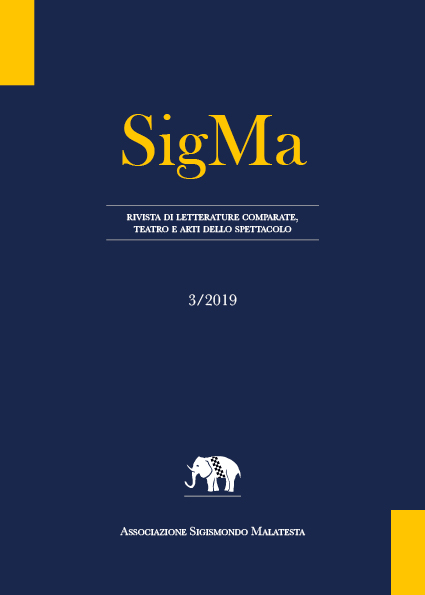Dalle ‘stories’ alla storia. “Roman national” di Grégoire Beil: micronarrazioni e miti del quotidiano
Abstract
In che modo è possibile rappresentare, cinematograficamente, la quotidianità? La questione è complessa e riguarda la natura del medium stesso. Le recenti evoluzioni tecnologiche dei dispositivi in grado di produrre, condividere e riprodurre immagini in movimento, in questo senso, non hanno fatto che mettere in risalto la componente intimamente quotidiana del medium. Tale componente sembra confliggere con una ‘vecchia’ esigenza: organizzare le immagini di tale quotidianità sotto forma di racconto.
Il cinema contemporaneo si è spesso confrontato, più o meno consapevolmente, con questi temi. Il film Roman national (2018) di Grégoire Beil, tra gli altri, è particolarmente emblematico: giustapponendo autorappresentazioni di individui qualunque (stories raccolte attraverso il social media Périscope) il regista cerca qui una visione corale, attraverso un’impressione di realtà che, proprio nella sua ostinata spontaneità, sembra relegare la Storia fuori campo, a elemento di contesto. Questa ‘unitarietà frammentaria’ può essere interpretata, come si tenterà di fare, nei termini di una mitizzazione del reale, attraverso pratiche soggettivizzanti le quali, lungi dall’offrire un qualche incremento di autenticità, non fanno che emergere la natura essenzialmente mitica su cui la nostra realtà quotidiana è fondata. All’interno di questo schema tecnologico-percettivo sembra articolarsi un diverso rapporto tra microstorie e macrostoria, laddove le prime non necessariamente compongono la seconda, ma possono talvolta contraddirla, o negarla. La complessità della Storia, secondo questa dialettica, verrebbe celata dalla stessa ambizione, caratteristica del medium cinematografico, a rappresentarla.
Downloads
SigMa pubblica in internet, ad accesso aperto, con licenza:
|
|
CCPL Creative Commons Attribuzione |
L'autore conserva il copyright sul suo contributo, consentendo tuttavia a chiunque "di riprodurre, distribuire, comunicare al pubblico, esporre in pubblico, rappresentare, eseguire e recitare l'opera", purché siano correttamente citati l'autore e il titolo della rivista. L’autore, al momento della proposta di pubblicazione, è inoltre tenuto a dichiarare che il contenuto e l’organizzazione dell’opera è originale e non compromette in alcun modo i diritti di terzi, né gli obblighi connessi alla salvaguardia di diritti morali ed economici di altri autori o di altri aventi diritto, sia per testi, immagini, foto, tabelle, sia per altre parti di cui il contributo può essere composto. L’autore dichiara altresì di essere a conoscenza delle sanzioni previste dal codice penale e dalle leggi speciali per l’ipotesi di falsità in atti ed uso di atti falsi, e che pertanto Reti Medievali è esente da qualsiasi responsabilità di qualsivoglia natura, civile, amministrativa o penale, e sarà dall'autore tenuta indenne da qualsiasi richiesta o rivendicazione da parte di terzi.

